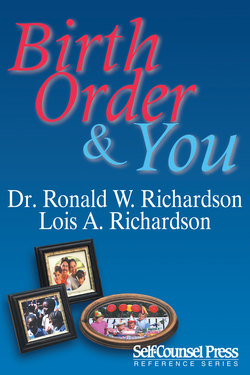Читать книгу Birth Order & You - Dr. Ronald W. Richardson & Lois A. Richardson - Страница 9
На сайте Литреса книга снята с продажи.
c. Sibling Distinctiveness
ОглавлениеWe each need to develop a distinctive identity or a separate sense of self. This need is driven by a desire for recognition, acknowledgment, support, and affirmation and is one of the major factors in creating differences between siblings. While some children may try to establish their identity by imitating a sibling who is clearly affirmed and recognized by their parents, the more common pathway is to find something that will distinguish self from others.
Identical twins demonstrate the principle most clearly. Those who were separated at birth and raised in different families are more like each other in personality than those who are raised in the same family where they try to be different from each other.
The first child in a family usually identifies with the parents’ values and works at becoming what they want. The second child (especially a second child of the same sex as the first) will most likely not be able to compete with the first one. He or she will therefore learn to open up new territory, try out new behaviors, and seek a different route for getting affirmation and recognition.
This can be a problem, however, if what the parents value most is reflected in the first child. The second child (especially of the same sex) may be seen as less “good” than the first — less competent at doing whatever it is that the parents value. Sometimes, when the first child is good at being “good” (i.e., fulfilling parental expectations), the second child gets his or her recognition by being good at being “bad.”
Younger siblings tend to define themselves according to whatever territory has already been claimed by the older child. In therapy, two adult sisters began to explore this dynamic and the resentments between them that had resulted. May spoke of how much she envied the academic achievements of her older sister Alice, who clearly pleased her parents with her abilities. Quite early on, May decided she could not and would not compete with Alice in that area. She put more energy into friends, her social life, and team sports. She also became a cheerleader and eventually ended up becoming a television actress. It was news to her to hear how much Alice envied her. While they were growing up, May not only had a lot of dates, but seemed to Alice to be favored by dad since he appreciated and enjoyed her activities more than Alice’s quiet work in the chemistry lab. As an adult, Alice wished she had the kind of public recognition May had.
